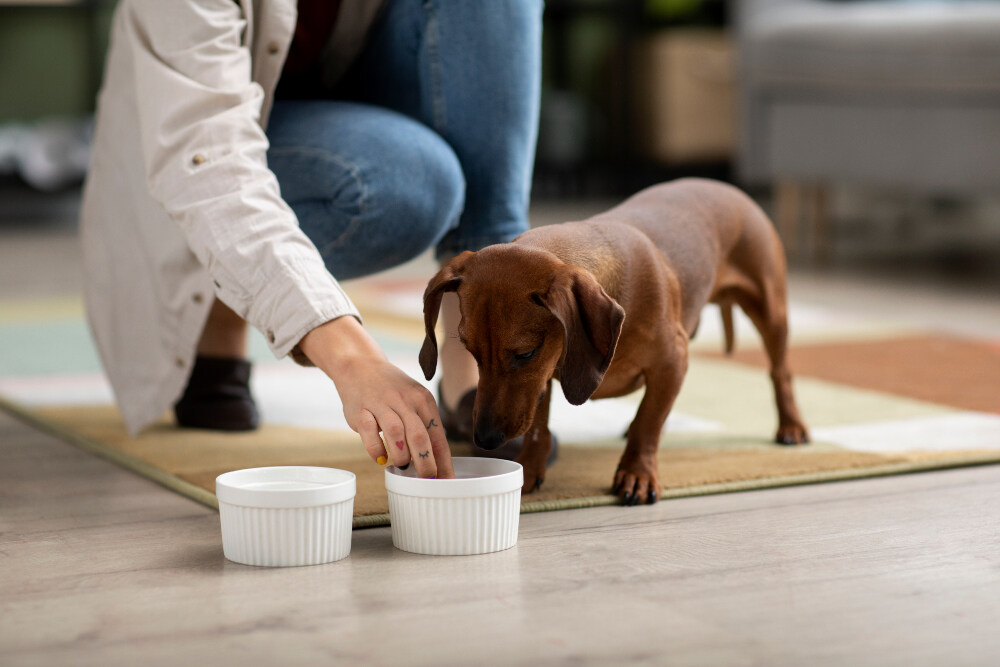Why Puppies Won’t Eat & What to Do About it?

As a pet parent, it’s distressing to see your puppy avoid meals. A lack of appetite can signal stress, teething pain, or an underlying issue. Understanding the possible reasons and taking action quickly can ensure your puppy stays healthy and happy.
Common Reasons Puppies Refuse to Eat
Puppies may stop eating due to stress, teething, or health issues. Identifying the cause ensures their well-being. Let’s find out the reason behind your pet’s loss of appetite.
Stress and Anxiety
Puppies often feel stressed in new environments or after changes in routine. Loud noises, separation, or unfamiliar surroundings can reduce their appetite. If your puppy is new, give them time to adjust in a quiet and safe space.
Health Problems
A refusal to eat may indicate an illness. Puppies are prone to issues like gastrointestinal infections, parasites, or serious conditions like parvovirus. Monitor for vomiting, diarrhea, or lethargy. If symptoms persist, consult a vet immediately.
Teething Pain
Teething is uncomfortable for puppies and starts around three to four months of age. Hard kibble may hurt their gums. Switching to softer food can make eating easier for them.
Food Preferences
Puppies can be picky. They may dislike certain flavors or textures of food. Low-quality meals lacking essential nutrients are often unappealing. High-quality, age-appropriate food is essential for their development.
Overfeeding or Too Many Treats
Treats are great for training, but too many can spoil your puppy’s appetite for regular meals. Puppies have small stomachs, so portion control is vital. Stick to a feeding schedule to ensure balanced nutrition.
Vaccination or Medication Side Effects
Certain medications or vaccines may temporarily suppress a puppy’s appetite. While this is usually normal, contact your veterinarian if the issue lasts more than a day.
What to Do If Your Puppy Won’t Eat
If your puppy isn’t eating, it’s important to act quickly to ensure their health and well-being. Let’s explore how to address this issue.
Create a Calm Feeding Space
Puppies need a quiet, stress-free area to eat. Feed them away from distractions, loud noises, or other pets. This helps them focus on their meal.
Experiment with Food Options
Try different brands, flavors, or textures of food. Warm meals slightly to enhance their aroma and appeal. Mixing wet food with kibble can also work.
Stick to a Feeding Schedule
Consistency builds a routine. Feed your puppy at the same times daily and remove uneaten food after 20 minutes. Avoid over-snacking between meals.
Address Teething Discomfort
If teething is causing discomfort, soften their kibble with water or offer wet food. Provide cold teething toys to soothe their gums.
Check for Signs of Illness
Observe your puppy for signs of vomiting, diarrhea, or lethargy. If they show these symptoms, visit a veterinarian promptly. Early treatment prevents complications.
Encourage Hand-Feeding
Some puppies may eat better when hand-fed. This creates a sense of security and strengthens your bond. Offer small bites to make eating easier for them.
How to Get Your Puppy to Eat

To determine the cause of your puppy’s cessation of feeding, your veterinarian must provide a diagnostic. It’s usually acceptable to entice your puppy with food that has been approved by your veterinarian and use other methods to get them to eat if your veterinarian has ruled out any illnesses.
- Serve healthy snacks, such as a piece of lean chicken or beef. This will also assist you in determining whether your puppy is simply being fussy or if there is a serious issue that requires medical care.
- Use strong-smelling foods to pique your puppy’s interest in eating, since this may make it more appealing. Peanut butter and liverwurst are popular choices.
- Give your puppy meat-based baby food, which is more appealing to most puppies and simpler to consume with a sore mouth.
- To prepare a slurry in the blender, combine dry ingredients with warm water or low-sodium chicken broth.
- Warm up your puppy’s food in the microwave for around 10 seconds, which will release the aroma and whet his appetite.
- Spike your puppy’s regular meal with yogurt or cottage cheese to entice him to eat, or serve a little bit of a nasty canned product high in meat or fat.
- If you have a cat, mix some dry cat food with your puppy’s meal. Most dogs prefer cat food due to its fragrance and increased protein content.
- Try hand-feeding your resistant puppy.
- Give your reluctant eater a small bit of food, and after they’ve had their fill or refuse to eat, take it away and try again an hour later. Leaving food out for a reluctant eater for an extended period of time may overwhelm the brain’s appetite centers, killing any hunger your puppy still has.
- If your veterinarian has ruled out a health concern and your puppy is refusing to eat even the best meals, use some behavior modification techniques. Reduce the number of goodies you give your dog (treats, like kids, tend to spoil a puppy’s appetite for meals) and stick to your dog’s regular feeding schedule.
- Purchase a new food dish or relocate the old one to a different area to make it more interesting; you could even try utilizing a food dispenser that your dog can partially control.
- If your dog’s appetite is still not what you’d want, take it for a walk or indulge in another form of activity before mealtimes.
- Consult your veterinarian if your puppy’s condition is serious. Depending on the diagnosis, she may prescribe medications to assist stimulate the appetite.
- If your puppy exhibits signs of low blood sugar (hypoglycemia), such as a drunken stride, weakness, or periodic convulsions, seek veterinary assistance right away. Meanwhile, if it appears frail, you could try raising its low blood sugar levels by applying something sweet to its gums, such as a small bit of pasteurized honey or Karo syrup.
Final Thoughts
Puppies may refuse food for many reasons, from stress to medical issues. Monitor their behavior closely to identify potential causes. Offering high-quality food, creating a stress-free environment, and sticking to routines can help. If your puppy’s appetite doesn’t improve or they show concerning symptoms, don’t hesitate to consult your vet.
Frequently Asked Questions
How long is it normal for a puppy not to eat?
A puppy skipping meals for a few hours can be normal. However, if they don’t eat for 24 hours, consult your vet.
Can teething cause appetite loss?
Yes, teething can make eating uncomfortable. Offering softer food or cold chew toys can help ease the discomfort.
What should I do if my puppy dislikes dry food?
Mix dry food with wet food or water. You can also try different brands to find one they enjoy.
Why do stress and anxiety affect appetite?
Stressful situations, such as moving to a new home, can reduce a puppy’s appetite. Provide a calm environment to help them relax.
When is appetite loss a serious issue?
Appetite loss combined with symptoms like vomiting, diarrhea, or lethargy is serious. Visit your vet immediately in such cases.
Tags
What do you think?
Related Articles

How to Care for Newborn Puppies: A Complete Guide
Caring for newborn puppies can feel overwhelming, especially when their survival depends on meticulous attention. Without proper feeding, warmth, and hygiene, these fragile pups are

How to Have Thanksgiving Dinner Without a Dog Begging at the Table
Thanksgiving is a time for family, food, and togetherness. However, a dog begging at the table can disrupt this special meal. Thankfully, with a bit

Keeping Pets Safe at Christmas: Essential Tips for a Joyful Holiday Season
The holiday season is a time for joy, family gatherings, and festive decorations, but keeping pets safe at Christmas should also be a top priority
